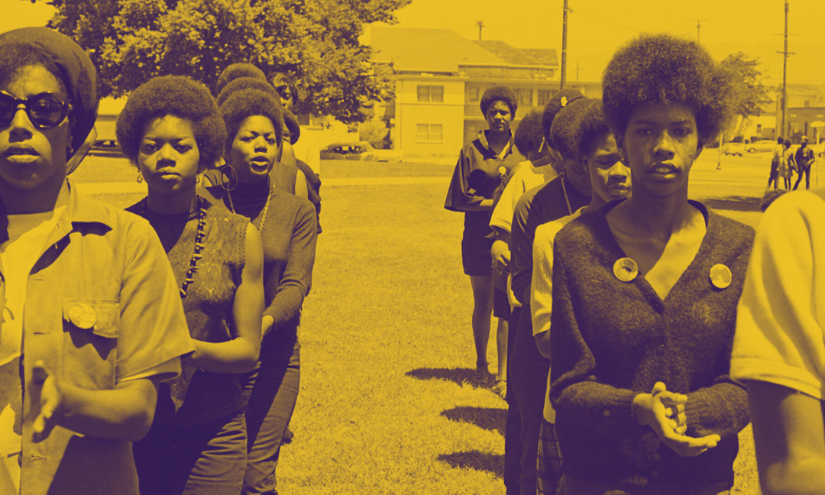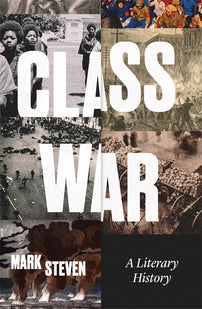No War But Class War
We must renew our understanding of our class belonging and of how we go to war – because that is the only way we are going to win.

The well-known slogan ‘no war but class war’ has been in high circulation in the first half of 2022. In this phrase, as ever, class war occupies the space between political action and literary art. Like so many invocations of class war, it is both description and proscription, a critical response to wars of extermination, which it forthrightly rejects, and a call to arms in the name of collective human flourishing: class war against wars of extermination; international solidarity versus ethno-nationalism.
While the oppositional grammar harmonizes with revolutionary sloganeering – ‘liberty or death’, ‘socialism or barbarism’, ‘communism or extinction’ – the referential content has its origin in popular storytelling. The formulation is said to derive from an episode of Days of Hope, the 1975 television series written by Jim Allen and directed by Ken Loach, mostly set in the northern counties of England between World War One and the General Strike of 1926. The series follows Ben Hargreaves, an enlisted soldier who becomes a socialist and deserts after witnessing the transposition of military atrocity from the imperial and colonial battlefields of France and Northern Ireland to labour disputes in the Durham coalfields. ‘I’m no pacifist’, he says when explaining his desertion from the British Army. ‘I’ll fight in a war, but I’ll fight in the only war that counts, and that’s the class war, and it’ll come when all this lot’s over’.
It was only later that the self enclosed phrase ‘no war but class war’ was taken up, first as a group name and rallying cry for anti-war movements in London associated with the anarchist group Class War as they remobilized in opposition to the 1990–91 Gulf War, the 1999 Kosovo War, and the 2001 Afghanistan War. In the first half of 2022, this phrase has undergone a resurgence in renewed social movements, popular and critical writing, and across the internet, and has been painted in red and black on banners and on walls, in Latin and in Cyrillic.
Regardless of its origins, ‘no war but class war’ cannot be separated from what Rosa Luxemburg described as the world historic problem of 1914: the challenge of knowing what kind of action will finally make good on the old cliché of ‘war against war’, converting political alarm into social revolution. This, she insisted, is ‘the actual problem that the world war has posed to the socialist parties, upon the solution of which the destiny of the workers’ movement depends’.
If the global conjuncture of 1914 elicited such imperatives from one of the world’s greatest revolutionaries, Luxemburg’s question has been answered in myriad ways throughout history – by Louise Michel and Louis Auguste Blanqui, by Vladimir Lenin and Leon Trotsky, by Mao Zedong, Frantz Fanon, and Che Guevara, by Huey P. Newton and Assata Shakur, and many others besides.
Their lives and their actions are part of a shared story that began in Haiti with Toussaint Louverture and made its way through England after the First Industrial Revolution, France at the end of the Second Empire, the American Gilded Age, revolutionary Russia and China, decolonial Africa, the guerrilla movements of Latin America, to erupt in urban revolt against fascism and racial capitalism in Italy and the United States.
That is the story we can sense behind the entreaties of ‘no war but class war’, a story about slaves and peasants and workers, about proletarianization and industrial disputes, about the struggle for decolonization, about guerrilla insurgency, about terrorism, vandalism, and sabotage, and about large-scale combat operations waged against the state and its military and paramilitary forces.
It goes without saying that ‘no war but class war’ is itself a literary form: five monosyllables, like the first or final line of a haiku, here arranged into a sonic chiasmus in which every part of the first and last feet, each a spondaic stomp, demands vocal emphasis. While repetition, as we encounter it with the repeated ‘war’, is the very definition of poetic language, here it is also doing political work. Philosophers, from Kierkegaard and Nietzsche to Deleuze and Derrida, have emphasized that repetition is as much about the production of difference as it is about similitude, that it opens up an ideological fracture within the space of language: our war, not theirs, against which we fight.
As sound and syntax transform these words from statement into something like a poem, let us re-emphasize that, within the story of class war, the relationship between politics and literature has always been mutually reciprocal. From the standpoint of politics, literature enables the transmission of revolutionary thought, military strategy, and ideological messaging across time and space; and from the standpoint of literature, a politics of class war serves as catalyst for aesthetic transformation, infusing literary forms and modes and genres.
Class war has never just been about taking up arms. It is not limited to the practice of warfare, which lends itself the kind of fetish that revolutionaries from England in the 1830s to Italy and the United States in the 1970s would come to characterize as ‘the delirium of military ideology’. Instead, and in the discovery of commonality through antagonism, class war has always had just as much to do with international solidarity, with embodied diversity, and with a commitment to collective betterment as it has with bullets, bombs, and barricades. And that is what unites our struggles today with a revolutionary past, linking our orphaned movements to the history and practice of class war. Now, as ever, we are engaged in the assembly of collective actions and mobilizations based in the shared conditions for living that have been forced upon us by capital. But we are also finding new connections, new ways of being together, through the lived experience of antagonism, and on a global scale.
Class war derives its vitality from the way its two constituent terms constantly revise and redefine one another. As an exhortation that finds form in both word and deed – from the revolutionary slogan painted on banners or shouted through a megaphone, with comrades standing together on the picket line or having one another’s backs in a riot, right down to the smouldering wreckage of armed propaganda – class war has always sought to synthesize new collective identities, and with them realize effective strategies for attack. Just as the admonition ‘let the dead bury the dead’ echoes another of Marx’s well-known metaphors, in which the proletariat stands forth as the gravedigger of capital, class war contains within itself an obligation to constantly renew our understandings of the collective revolutionary subject and of how that subject fights, of our class belonging and of how we go to war – because that is the only way we are going to win.
— An adapted excerpt from Class War: A Literary History by Mark Steven
[book-strip]
